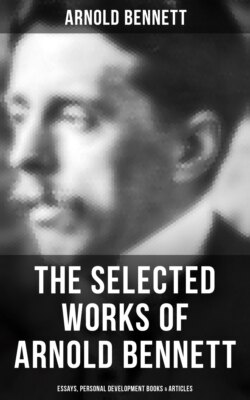Читать книгу The Selected Works of Arnold Bennett: Essays, Personal Development Books & Articles - Arnold Bennett - Страница 90
На сайте Литреса книга снята с продажи.
Writing a Marketable Play.
ОглавлениеIn conceiving a play, the dramatic aspirant should consider, at the very beginning, what theatre it is likely to suit best, and he should arrange the characters so as to suit the principal regular actors and actresses at that theatre. The casting of a piece is a difficult, delicate, and extremely important business, and many a play has been refused, or has been “hung up” for years, because of the impossibility of satisfactorily casting it He must also remember that actor-managers and leading ladies nearly always insist on “sympathetic” parts. One actor-manager declines to make love on the stage. Another declines to appear without making love. One leading lady likes to play pretty widows. Another insists on being either a pure English maiden or a newly-wed wife. These persons know what they can do with the greatest effect; they know what secures the loudest “call”; and they naturally insist on doing just that thing and no other— especially as they happen to live and flourish at a time when the drama is regarded by the public as secondary in importance to the individualities of the interpreters. To-day, the play must adapt itself to the company, and not the company to the play. Artistically, this system is entirely vicious, but there it is; and there it will be until a few dramatists of first-rate importance supervene and alter it.
The dramatic aspirant must also bear in mind that the following points are essential in a marketable play:—
(1) Plenty of contrasting action and business, and at least one big “situation” in each act.
(2) Effective “curtains” to each act.
(3) Plenty of comic relief.
(4) A luxurious environment.
(5) At least one character of great wealth, and a few tided characters if possible.
(6) Sentimentality in the love scenes, and generally throughout
(7) A certain amount of epigram in the dialogue.
(8) No genuine realism, unless it is immediately made palatable by subsequent sentimentality.
(9) A happy ending. Or at any rate a decent ending—such as the suicide of a naughty heroine.
In regard to composition, the remarks which I made about fiction apply with almost equal force to the drama. “Accurate construction” is the first and most important step in the process. The first act is seldom difficult to construct, the last act is always difficult; it is easier to propound a problem than to solve it In playwriting the plot is everything— or nearly so. Once the plot is soundly done, the dialogue—as a dramatist phrased it to me —is “as easy as falling off a log.” The aspirant must never lose sight of the fact that a play is nothing but a story told through the mouths of the people in the story. Let him insist on that truth to his unconscious self: A play is a story. A play should only contain matter which helps to tell the story, and when the aspirant ceases to tell the story in order to be funny, or to draw tears, or to convey a moral or immoral lesson, he is sinning against the canons of playwriting whether commercial or artistic.
What the public wants, and therefore what the managers want, is amusing plays, digestive plays. A moderately clever amusing play has a better chance than a very clever serious play. In this connection I will point out that the only class of modern play in which it is possible to be both quite artistic and quite marketable, is the farce.
